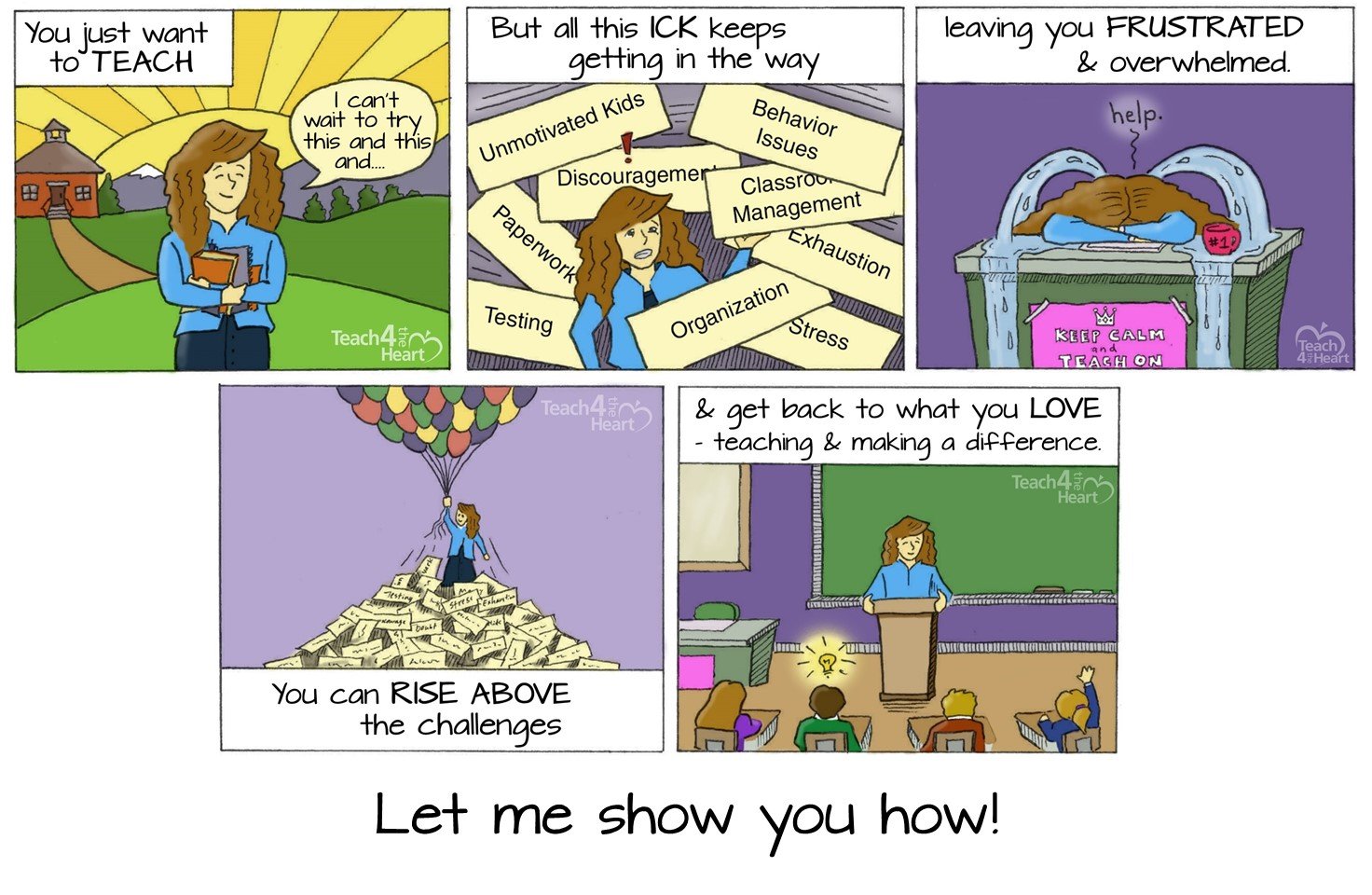I ran the final grades and my heart sank.
I had done everything I could. This wasn’t unexpected.
But I was still hoping…
Unfortunately, numbers don’t lie.
And “Johnny” had just failed my class.
When Johnny Fails
If you’ve had students fail your class, you know how disheartening it can be for everyone involved.
For many of you, what happens next is out of your hands. The decision is made by administrators, specialists, or maybe even an across-the-board social promotion policy (don’t get me started).
But others of you may be asked to be involved in the process of deciding what happens next.
So for you, I offer a few thoughts.
Deciding if Johnny Should Repeat a Grade (or Class)
When deciding whether or not a student should repeat a grade, I believe there’s really only one question to consider:
What is really best for the student?
Because, really, does anything else matter?
The exact GPA, the # of assignments that were and were not completed, the challenges, the struggles – all of this information is only significant when it helps answer that burning question – what is best for the student. There’s really only one question to consider: What is really best for the student?
Unfortunately, this question isn’t so simple. And often the answer is a bit elusive.
The parents may argue that the best thing is to pass their little Johnny along post-haste. He has enough challenges already. Please don’t hurt his self-esteem.
Um, that might sound like an easy answer, but I ask again – is that really what’s best for little Johnny?
On the other hand, the teacher may argue that if you don’t hold Johnny back, then grades mean nothing and what’s the point anyhow.
Again, though, are grades more important than a student?
What’s really best for him?
Every situation is different, with its own flavors, intricacies, and nuances.
But here’s a few thoughts that might help….
What’s Really Best for Johnny?
- Students who are passed into the next grade without the proper skills often get more frustrated and confused. Think about it. If they struggled with math in 1st grade, the problems get harder the next year. So simply promoting them will likely leave them more confused than ever. Is that really best for them?
- Students often learn better the second time around. I’ve had students who failed my Algebra I class retake it the next year and make A’s and B’s. Seriously. Sometimes it does a world of good to see the same concepts again. Imagine how much more confident those students will be when they show up in Algebra 2.
- Sometimes kids need to learn natural consequences. If a student fails because they didn’t do their work, they may need to learn a valuable life lesson. Just passing them on may teach them that laziness pays off. And that will certainly not be good for them in the long run.
- Other factors may be involved. Before making a decision, consider what other factors are at play. Did the student’s parents get divorced this year? Did they have a major crisis? These outside factors should not simply be excuses for the poor grades, but they tell an important story and need to be part of the decision.
- There are other options than just passing on and holding back. You may have picked up that I’m not a big fan of just passing a student on to the next grade. That’s because in *most* cases, this really isn’t what’s best for the student. However, holding a student back can also present a host of problems. Fortunately, these aren’t the only two options.
Alternatives to Holding a Student Back
Consider some of these options, but always come back to the burning question – What is best for the student?
- Summer school. Is the student seriously deficient in certain skills, require them to attend summer school. Just make sure the summer school will actually help them improve, & not just consist of “putting in their time.”
- Self-guided (or parent guided) summer learning. This can be a great option if a student failed not because they didn’t understand but because they didn’t do their work. Create a comprehensive summer assignment that must be completed in full in order for them to move on to the next grade. (And be ready to follow through if they don’t get it done.)
- Required tutoring. Summer tutoring can work wonders, so why not require the student to spend so many hours with a tutor?
- Academic probation. Academic probation affects the student when they return to school the following year and can consist of whatever requirements are best for the student. For example, they could be ineligible for extra-curricular activities for the first quarter. Or, they are contingently passed to the next grade but if they receive a D or F in any core classes on their first report card, they will be returned back to the prior grade.
Just ask yourself what makes sense for that student then be sure to put the whole thing in writing and clearly explain it to the student and parents. (I’d recommend getting them to sign that they understand and agree to all of the nuances of the probation.) - Combination. Often the best approach is a combination of the above methods (or even of another creative option). For example, if Johnny failed both math and spelling, he might be required to attend summer school for math and complete a summer assignment for spelling. He may also have an academic probation that states he must maintain a C average to be eligible for extracurricular activities the next year.
What is your school’s policy when a student fails a class? What other suggestions do you have?




I think it truly depends on the student… I have one student right now that does not have a clue how to do most of the 6th grade math we just spent a year working on… so I think repeating would help him. I have another student that is super bright and can learn quickly but he played a lot this year and it caused him to fail. I know he could learn the material next year in 7th easily and do well… putting him back for the sake of a punishment… I am not sure that is in his best interest.
I think it truly depends on the student… I have one student right now that does not have a clue how to do most of the 6th grade math we just spent a year working on… so I think repeating would help him. I have another student that is super bright and can learn quickly but he played a lot this year and it caused him to fail. I know he could learn the material next year in 7th easily and do well… putting him back for the sake of a punishment… I am not sure that is in his best interest.
In my school we are not really allowed to give Fs…teachers get hauled into the principals office if a D or F is on a kid’s progress report or report card and made to explain why. Teachers are basically blamed for it. Grades mean nothing where I am, which unfortunately the kids know. 🙁
I agree it depends on the student, but I think there is a larger issue to consider here.
If we don not teach children how to fail AND recover from failure, are we doing the world any good? Success is not guaranteed. If I do not perform my job to my boss’s specifications, should I expect a promotion? Life is not a ‘do your time and get ahead’ game. It is a ‘work hard, learn all you can, perform as best you can, and hope to break even’ reality.
Case 1: A mother came to me furious because her secon grade son got a “C” on his special education math test. (He could not count ten objects.) Her complaint, “How is this supposed to encourage him to do better?” Grades are encouragement?!?
Case 2: A teenager who was developmentally seven years old graduated ‘with honors’ from special education. She couldn’t tell you what state she lived in, but she told me she was going to be a doctor.
She went into deep depression for months when she found out she could not get into community college.
Let’s give education a reality check. Not everyone CAN be president when they grow up. Some NEED to work at Walmart as greeters. Even ‘normal’ children will not excel in all subjects. They should not be taught that they are failures if they are not good at one thing. They should be taught to look at their strengths and find goals that make them happy. It should be our job as educators to help them find their niche, and learn to live as best they can.
Case 3: A young couple worked at the resource center folding inserts for packages. They had a daily contest to see who could fold the most, and the winner got to pick the television program that night. They knew their limits, but reached for their goals with a joyful mentality. That, to me, is success.
I agree it depends on the student, but I think there is a larger issue to consider here.
If we don not teach children how to fail AND recover from failure, are we doing the world any good? Success is not guaranteed. If I do not perform my job to my boss’s specifications, should I expect a promotion? Life is not a ‘do your time and get ahead’ game. It is a ‘work hard, learn all you can, perform as best you can, and hope to break even’ reality.
Case 1: A mother came to me furious because her secon grade son got a “C” on his special education math test. (He could not count ten objects.) Her complaint, “How is this supposed to encourage him to do better?” Grades are encouragement?!?
Case 2: A teenager who was developmentally seven years old graduated ‘with honors’ from special education. She couldn’t tell you what state she lived in, but she told me she was going to be a doctor.
She went into deep depression for months when she found out she could not get into community college.
Let’s give education a reality check. Not everyone CAN be president when they grow up. Some NEED to work at Walmart as greeters. Even ‘normal’ children will not excel in all subjects. They should not be taught that they are failures if they are not good at one thing. They should be taught to look at their strengths and find goals that make them happy. It should be our job as educators to help them find their niche, and learn to live as best they can.
Case 3: A young couple worked at the resource center folding inserts for packages. They had a daily contest to see who could fold the most, and the winner got to pick the television program that night. They knew their limits, but reached for their goals with a joyful mentality. That, to me, is success.
Touchy subject. In 28 years I’ve retained 2 kiddos. One was a medical reason. The other just plain worked out well. Being a 4th grade teacher it’s very hard to retain, but what do we do with kiddos who aren’t to standard, don’t have help at home, and are so far behind? I pray for these kiddos who don’t fit the Light’s Retention Scale which is what my school uses. I wish we could retain more kids.